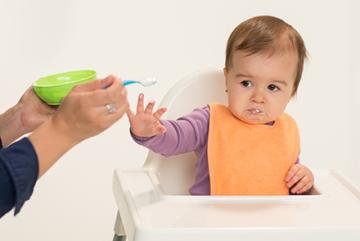A Baby's Early Personality May Predict its Weight at One Year Old

An ARS study shows that infants who display less joy while eating tend to gain more weight than infants who smile, giggle, and babble more in fun play-based games. (USDA photo)
More than one-third of American youth are overweight or have obesity. The question is how to stop the trend. Researchers at the Agricultural Research Service’s (ARS) Children’s Nutrition Research Center (CNRC) at Baylor College of Medicine (BCM) in Houston, TX, are on the case.
“[The] prevalence of child obesity is concerningly high, despite our best efforts. This suggests that we need innovative approaches to address this issue,” said Deborah Thompson, ARS nutritionist. “Our project does this by addressing child obesity prevention from multiple perspectives.”
One such perspective is the child’s developing personality.
“Many of the factors that we think influence obesity are present from birth and take shape as the infant grows and develops,” said Alexis Wood, associate professor of pediatrics at BCM. “How we respond to internal emotions and external experiences influences our eating behaviors. By studying this from a very young age – and by looking at which parts of our personality in infancy influence our body weight – we can hopefully help children and their caregivers maintain a healthy weight trajectory right from the start of life.”
Health issues in adulthood, associated with being overweight in childhood, include increased risk of cardiovascular disease, type 2 diabetes, and several cancers. Psychosocial effects may occur much earlier in life; stigmatizing people according to their weight often contributes to bullying and isolation, which can put youths at risk of depression and low self-esteem.
“These issues impact current and future quality of life,” Thompson said. “By exploring child obesity from multiple perspectives, we aim to increase our understanding of ways to best address this urgent public health issue.”
Among the researchers’ discoveries is that parental feeding styles can influence their child’s eating and physical activity behaviors, and that a child’s temperament while eating may influence weight gain.
“We are interested in how several aspects of temperament relate to weight,” Wood said. “In the current study, our main interest was in ‘positive affect,’ which refers to how much joy a child shows.”
The research team observed children and counted behaviors such as smiles, laughs, positive vocalizations, and rated how intense those behaviors were. Generally speaking, Wood saw that infants who smile, giggle, and babble more in fun play-based games when their primary caregiver is present gain less weight than those who display less joy. However, infants who show more of these joy-related behaviors when their caregiver is not present may gain more weight.
While positive temperament seems to be related to health outcomes, the relationship is complicated, since it depends on what the child is doing when joy was assessed, and the question of nature versus nurture is ever-present.
“Almost all human traits are, at least in part, genetic; but that does not mean they cannot be changed by the environment,” Wood said. “In this way, even for the genetic part of obesity that operates through a child’s metabolism and temperament, other factors in the food environment can still shape the child’s eating behaviors and influence its weight status.”
The research team also found that, how parents interact with their children around food and meals can vary greatly, and researchers need to consider both mothers and fathers.
“We found that fathers use different parenting practices to influence their children’s eating and physical activity,” said Teresia O’Connor, professor of pediatrics at CNRC. “Some studies have found that a father’s influence is different and even stronger than that of mothers. [We need to conduct] more research to better understand the important influence fathers have on their children’s lifestyle behaviors and health outcomes.”
The team is continuing its research to verify its assessments by conducting a follow-up study. In it, they examine biomarkers in infants’ blood to document the biology that links infant temperament, food intake, and weight. Wood said this information could deepen the understanding of why infant temperament is linked to child weight by using a scientific approach.
“I think [we need to] recognize that infants are important, complex humans with very sophisticated ways of interacting with the world,” Wood said. “[We’re] building evidence that, even at 4 months of age, infants can play a role in shaping their health. Previously, many have focused on clinicians and caregivers as the key players – it is time to recognize the role of the infant.” – by Scott Elliott, ARS Office of Communications
Also in our series on Healthy Eating for Infants and Children:

